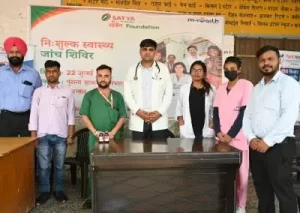- info@satyashaktifoundation.org
- Mon - Sat: 09.30 AM - 06:30 PM
Primary Healthcare Initiatives: Vital for Tackling Poverty
admin
10 November 2022
No Comments
Primary Healthcare Initiatives: Vital for Tackling Poverty

In India, 70% of healthcare expenditures are borne by individuals. Therefore, yearly OOPE (Out-of-pocket expenditure) on health care drives 60 million people into poverty. When it comes to health care, the World Health Organization (WHO) emphasizes a “whole-of-society approach” that “aims to ensure the highest possible level of health and well-being and their equitable distribution by focusing on people’s needs and as early as possible along the continuum from health promotion and disease prevention to treatment, rehabilitation, and palliative care, and as close as feasible to people’s everyday environment.”
In India, the closest hospitals are the Primary Health Centres (PHCs) and their satellite clinics in the smallest communities, the villages, and gram panchayats. Primary healthcare in India faces many obstacles, as highlighted by the Finance Commission 2020. Low investment and weaker institutional capability on the supply side, such as insufficient doctors, paramedics, and hospitals, and the inadequate number of PHCs and sub-centers, are examples of structural difficulties. Therefore, the government should raise health expenditure, mainly primary healthcare. NGO Health, to lessen the burden on the poor. Thus, efforts centered on primary healthcare are urgently required to improve access to primary care and lower OOPE.
The meaning of primary healthcare.
Since the term “primary health care” (PHC) was coined in 1978, many people are uncertain of its meaning and implementation. A clear and succinct definition has been prepared to help coordinate future PHC projects on a global, national, and local basis. WHO defines PHC as a whole-of-society approach to health that focuses on people’s needs as early as possible throughout the continuum from health promotion and disease prevention to treatment, rehabilitation, and palliative care. Comprehensive, integrated health services that centre primary care and public health goods and functions; multi-sectoral policies and actions to address upstream and broader determinants of health; and engaging and empowering individuals, families, and communities to raise social participation and improve self-care and self-reliance in health (PHC).
If primary care is crucial, why don’t more people use it?
Primary health care is the most efficient, cost-effective, and equitable approach when it comes to enhancing people’s overall physical and mental health as well as their economic and social prosperity. Investment in Primary Health Care continues to show global reach, especially in crises like the current COVID-19 pandemic. Investments in NGO Health have positively affected health outcomes, health system accountability, and health equity in countries worldwide. The evidence is overwhelming that many factors beyond health services have a vital role in determining health and well-being, even though some are directly tied to the health system and access to health services. Food and water security, schooling, and ecological balance are crucial. Primary health care is also essential for health systems to be more crisis-proof, preventative in spotting the early warning signs of epidemics, and reactive to sudden spikes in demand for services.
Mobile Healthcare Unit – An initiative of Help Age
The Mobile Healthcare Unit (MHU) from HelpAge is there to offer long-term medical care to the elderly in need and their neighbors. One can expect to find a medical doctor, a pharmacist, and a social worker in each MHU. Udaipur, Rajasthan’s rural communities, benefit from the Mobile Health Care Unit’s services. The NGO provides free consultations, treatment, drugs, tests, and counseling for common and non-communicable diseases like diabetes, arthritis, asthma, hypertension, refractive error correction, and more.
The need for a focus on primary healthcare
When it comes to health, the Sustainable Development Goals (SDGs) and universal health coverage are necessary, according to the World Health Organization (WHO), which has repeatedly stressed the importance of primary care. Increased poverty, malnutrition, education, gender inequality, lack of clean water and sanitation, fewer jobs, slower economic growth, less equity, and less climate action all stem from insufficient primary healthcare. NGO Health‘s support for the Mobile Health Unit and Amrit clinics exemplifies the type of direct healthcare intervention that not only improves the health of people in the world’s most inaccessible regions but also helps to keep them from falling further into poverty.
Reaction of WHO
Achieving UHC, SDG3, and health security require primary health care, and WHO is assisting countries in reorienting their health systems to provide for this. The healthcare system needs to be user-environment-and goal-appropriate. A supported health system, NGO includes efforts to improve maternal, newborn, child, and adolescent health; healthy aging; sexual and reproductive health; medicines and medical supplies; emergency preparedness, response, and recovery; and work on communicable and non-communicable diseases. Improving health governance and financing; the health workforce; gender, equity, and rights; information systems; quality and patient safety; and work on communicable and non-communicable diseases are all components of a bolstered health system.
Conclusion
Through its Primary Health Care Initiative, the World Health Organization (WHO) collaborates with members of civil society activists on both the international and national levels to improve primary health care systems, which are essential to the provision of universal health coverage. This system must meet the bulk of people’s medical needs.
Recent Comments
No comments to show.
Subscribe
Subscribe to our newsletter for the latest update.
Contact Us
- DPT 004, Ground Floor, DLF Prime Towers, Block- F, Okhla Phase-1, New Delhi- 110020 India
- +91-011 408 45450
- info@satyashaktifoundation.org
- Mon - Sat: 09.30 AM - 06:30 PM
-
© Copyright 2023 SATYA Shakti Foundation, All Rights Reserved. Developed By Kitoinfocom Pvt Ltd



Leave a Reply